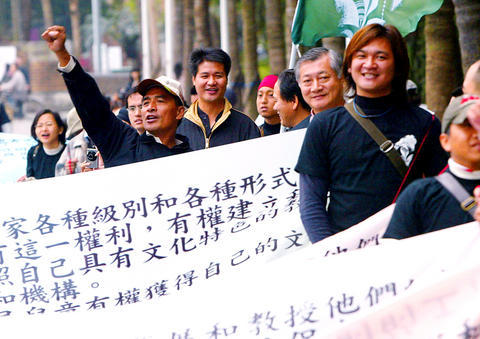Hundreds of Aborigines from across the country took to the streets of Taipei yesterday to call on the government to respect Aboriginal rights as outlined in the Aboriginal Basic Law (原住民族基本法) and the UN Declaration on the Rights of Indigenous Peoples.
"We would like to call on the government, which is actively seeking UN membership, to respect the rights outlined in the UN declaration, as well as in our own Aboriginal Basic Law," Yohani Isqaqavut, leader of the parade, said before the marchers departed from National Taiwan University.
Yohani is a minister of the Taiwan Presbyterian Church and was formerly minister of the Council of Indigenous Peoples.

PHOTO: CNA
The declaration and law include the rights to lands, resources, culture and self-determination.
"We'd also like to urge all non-Aboriginal fellow countrymen to respect and support our cause," Yohani said. "But most importantly, we want to raise the awareness of all Aborigines about their own rights -- because rights don't just fall from heaven, you must fight for them."
Many members of other non-governmental organizations, such as the Taiwan Association for Human Rights, joined the march.
At Ketagalan Boulevard, in front of the Presidential Office, representatives from the groups took copies of a petition to the Legislature, the Executive Yuan and the Presidential Office, hoping to meet Legislative Speaker Wang Jin-pyng (王金平), Premier Chang Chun-hsiung (張俊雄) and President Chen Shui-bian (陳水扁).
However, only Chang was available to receive the delegates.
"I asked Chang why the government did not respond when the declaration was passed in September, but he didn't answer. He said the declaration and the Aboriginal Basic Law already overlap by about 90 percent," Payen Talu said after returning from the Executive Yuan.
The answer did not satisfy the activists.
"If the Basic Law is the answer, how come Aborigines in Hualien were never consulted on the planned construction of the Suhua Freeway, which will pass through regions inhabited by those Aborigines?" Omi Wilang, an activist asked.
Demonstrators also urged the legislature to pass the Aboriginal autonomy bill sent for legislative review by the Cabinet earlier this year.
"We will continue our struggle until the day when Aboriginal autonomy becomes a reality," a demonstrator said.

Alain Robert, known as the "French Spider-Man," praised Alex Honnold as exceptionally well-prepared after the US climber completed a free solo ascent of Taipei 101 yesterday. Robert said Honnold's ascent of the 508m-tall skyscraper in just more than one-and-a-half hours without using safety ropes or equipment was a remarkable achievement. "This is my life," he said in an interview conducted in French, adding that he liked the feeling of being "on the edge of danger." The 63-year-old Frenchman climbed Taipei 101 using ropes in December 2004, taking about four hours to reach the top. On a one-to-10 scale of difficulty, Robert said Taipei 101

Nipah virus infection is to be officially listed as a category 5 notifiable infectious disease in Taiwan in March, while clinical treatment guidelines are being formulated, the Centers for Disease Control (CDC) said yesterday. With Nipah infections being reported in other countries and considering its relatively high fatality rate, the centers on Jan. 16 announced that it would be listed as a notifiable infectious disease to bolster the nation’s systematic early warning system and increase public awareness, the CDC said. Bangladesh reported four fatal cases last year in separate districts, with three linked to raw date palm sap consumption, CDC Epidemic Intelligence

US climber Alex Honnold left Taiwan this morning a day after completing a free-solo ascent of Taipei 101, a feat that drew cheers from onlookers and gained widespread international attention. Honnold yesterday scaled the 101-story skyscraper without a rope or safety harness. The climb — the highest urban free-solo ascent ever attempted — took just more than 90 minutes and was streamed live on Netflix. It was covered by major international news outlets including CNN, the New York Times, the Guardian and the Wall Street Journal. As Honnold prepared to leave Taiwan today, he attracted a crowd when he and his wife, Sanni,

Taiwanese and US defense groups are collaborating to introduce deployable, semi-autonomous manufacturing systems for drones and components in a boost to the nation’s supply chain resilience. Taiwan’s G-Tech Optroelectronics Corp subsidiary GTOC and the US’ Aerkomm Inc on Friday announced an agreement with fellow US-based Firestorm Lab to adopt the latter’s xCell, a technology featuring 3D printers fitted in 6.1m container units. The systems enable aerial platforms and parts to be produced in high volumes from dispersed nodes capable of rapid redeployment, to minimize the risk of enemy strikes and to meet field requirements, they said. Firestorm chief technology officer Ian Muceus said